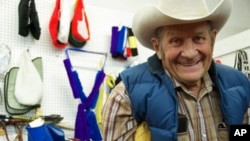Bob Schild has lived his life the cowboy way, growing up practically on the back of a horse in eastern Idaho. He rode bucking horses and bulls at rodeos around the country. It was during those rodeo days that Schild discovered poetry and began to mesh his two passions together.
Schild is nursing a broken leg. A few weeks ago, his horse spooked when a herd of sheep came over a hill. He came off and the horse stepped on his leg. It's just part of being a cowboy and it's those experiences - even the painful ones - that Schild finds inspiring.
"That's where Cowboy poetry originally came from. The famous cowboy poets - like Curly Fletcher - they wrote about what they knew," he says. "And that's exactly what I try to do."
Take a poem he wrote for a long time rodeo buddy who kept competing long after Schild quit. The last time Schild saw him, he made a suggestion.
"'Ron, you're too darn old to ride bulls and if nothing else the law of averages will get you in time, so you should quit,' and he replied 'That's the only thing I know. I'd just as soon go that way' and so he went that way."
Schild's poem details the cowboy's end.
"…..A hoof, a horn, an unplanned abort, abruptly ends the trail. A rip instead, a gush of red, a cowboy's face turned pale….."
"These come from the heart and that's where cowboy poetry is supposed to originate," says Schild, who started writing poetry during his rodeo days in the 1950s.
"Two Canadian cowboys and I were traveling together rodeoing and some of those drives were marathons. They'd compete on a Friday, say, then get back on the road for a 15-hour drive to be at another rodeo the next night," he says. "And we got started reciting cowboy poetry to stay awake, actually by Robert Service and some of the old ballad type poems."
Those long drives helped him learn the rhythm of cowboy poetry while riding saddle broncs and bulls gave him something to write about.
"I'd always rode bad horses. When we were kids my dad was a horse trader and he was always buying something that wasn't broke and my brother Jack and I couldn't have been more than 12 years old when we started getting on those kind of horses."
But it wasn't until he went to college at the University of Idaho that he really checked out rodeo.
"I didn't have any money. I had $140 and a train ticket and a $100 scholarship to go to school a year on, plus a 65-cent-an-hour job cleaning box stalls. And the point I'm trying to make, I was in good physical condition accidentally because I'd been cleaning box stalls four hours every day."
So he was in good shape when a friend took him to watch the university rodeo team practice. He got to the arena to find out that no one would ride the wild horses in the chutes. That's when Schild got an idea.
"'I'll ride him if you need someone to get on him' and that's where my rodeo career started. I said 'If you put a saddle on him, I'll ride him' so they put a saddle on him and I rode him."
He didn't have any money to rodeo so a friend paid his entry fee to compete in his first rodeo in Salem, Oregon. He won, placing first in bronc riding and coming away with trophy buckles and $50. Schild ended up transferring to a college in Colorado so he could rodeo more. He won buckles, saddles and titles. After finishing up his animal science degree, he competed on the pro rodeo circuit, riding saddle broncs, bareback horses and even bulls.
After 18 years, Schild left rodeoing and used his winnings to open up a leather shop. His rodeo days might be over, but as for those tales of scraping by and life on the road - they live on in Bob Schild's poems.




